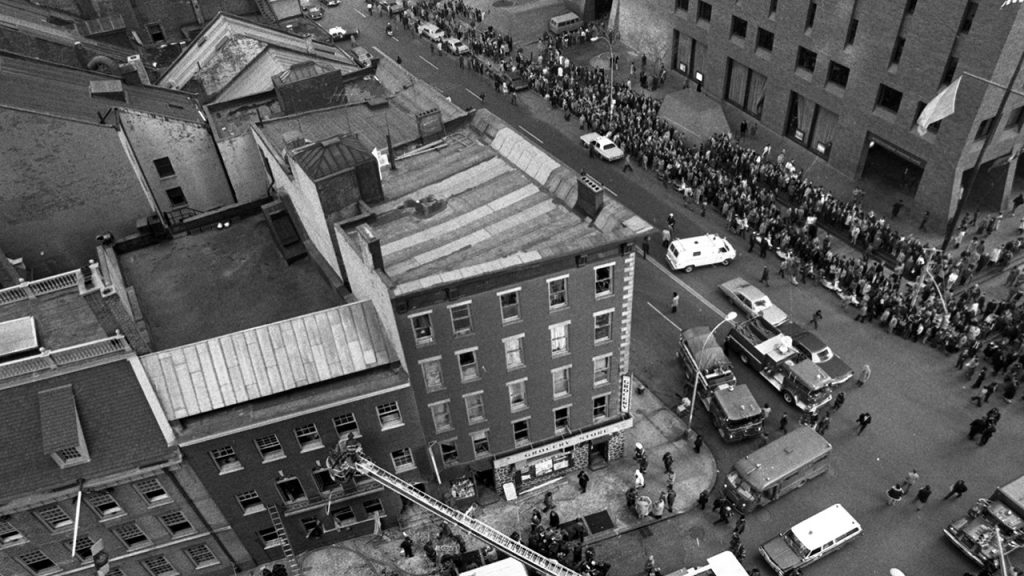Fifty years ago, on January 24, 1975, a moment of American history was tragically marred by an act of terrorism. The Fraunces Tavern, a cornerstone of American liberty and the site where George Washington bid farewell to his troops after the Revolutionary War, was bombed by the Puerto Rican separatist group FALN. The lunchtime explosion claimed the lives of four innocent individuals – Harold Sherburne, Alex Berger, James Gezork, and Frank Connor – and injured over 50 others. This attack wasn’t merely an act of violence; it was a symbolic assault on the very foundations of American freedom, targeting a place deeply intertwined with the nation’s birth and ideals. The FALN sought to shatter the symbol of American liberty and justice that Fraunces Tavern represented, striking a blow against the heart of the nation’s narrative.
Joe Connor, the son of Frank Connor, was only nine years old when his father became a victim of this heinous act. The bombing irrevocably altered his life, leaving an indelible mark that fueled a decades-long quest for justice. Connor has channeled his grief and anger into a relentless pursuit of accountability for those responsible for the Fraunces Tavern bombing. He authored the book “Shattered Lives: Overcoming the Fraunces Tavern Terror,” later adapted into a documentary, which chronicles the human cost of the attack and the ongoing struggle for justice. Alongside other victims’ families, elected officials, and law enforcement, Connor has tirelessly campaigned to bring the perpetrators to justice and prevent such atrocities from happening again.
The primary suspect in the bombing, Willie Morales, believed to be the FALN’s chief bomb maker, escaped to Cuba, finding refuge alongside an estimated 50 other U.S. fugitives. Cuba’s harboring of these individuals, including convicted cop killer Joanne Chesimard (aka Assata Shakur), has further complicated the pursuit of justice. A bill in Congress, named after Frank Connor and Werner Foerster (the New Jersey State Trooper killed by Chesimard), explicitly demands the return of these fugitives from Cuba. This legislative effort underscores the unwavering commitment to hold the perpetrators accountable and to deny them safe haven from the consequences of their actions.
The ongoing debate over Cuba’s designation as a State Sponsor of Terrorism has added another layer of complexity to this issue. While former President Biden removed Cuba from the list, his predecessor, President Trump, reinstated it, emphasizing the need to exert pressure on the Cuban government to extradite Morales and other fugitives. Senator Marco Rubio, during his confirmation hearing for Secretary of State, forcefully argued for Cuba’s continued inclusion on the list, citing their harboring of fugitives from American justice. This ongoing political tug-of-war highlights the challenges involved in navigating international relations while seeking justice for victims of terrorism.
Over the years, the passage of time has unfortunately led to acts of clemency for some FALN members, a development that has deeply pained the victims’ families and those who seek justice. President Clinton offered clemency to several imprisoned members of the group in 1999, while President Obama commuted the sentence of Oscar Lopez Rivera, convicted of seditious conspiracy. These acts of clemency have been met with criticism, as they appear to diminish the gravity of the crimes committed and the enduring pain suffered by the victims and their families. The argument remains that the passage of time should not erase the responsibility for such heinous acts.
Fifty years after the bombing, the NYPD and the Joint Terrorism Taskforce maintain an open investigation, demonstrating their unwavering commitment to pursuing justice. Commemorations of the bombing, including an emotional luncheon attended by family members, former FBI agents, survivors, and others, serve as poignant reminders of the enduring impact of the attack. Joseph Connor’s son, Frank, named after his grandfather, offered a benediction at the ceremony, a testament to the enduring legacy of loss and the unwavering hope for justice. The location of the gathering, near the very spot where the bomb was placed, served as a stark reminder of the devastating event and the ongoing pursuit of those responsible. The fight for justice continues, fueled by the determination of those impacted by the bombing and their unwavering belief that accountability is essential, regardless of the passage of time.

